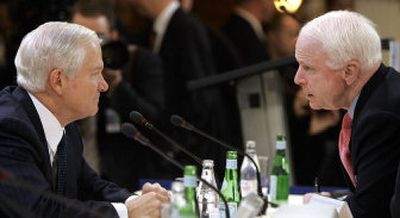Defense chief chides Putin for tough talk

MUNICH, Germany – Pentagon chief Robert Gates responded Sunday to Vladimir Putin’s assault on U.S. foreign policy by saying “one Cold War is enough” and that he would go to Moscow to try to reduce tensions. Gates also sought more allied help in Afghanistan.
He delivered his first speech as Pentagon chief at a security conference in Germany and then flew to Pakistan to discuss fears of a renewed spring offensive by Taliban fighters in neighboring Afghanistan. He arrived in Pakistan’s capital, Islamabad, this morning.
Pakistan, a close U.S. ally in the fight against terrorism, has faced charges that the Taliban militia stage attacks from Pakistan against Afghan government troops and NATO- and U.S.-led coalition troops.
Gates’ rebuke of the Russian president relied on humor and some pointed jabs.
“As an old Cold Warrior, one of yesterday’s speeches almost filled me with nostalgia for a less complex time. Almost,” Gates said. Then, as the audience chuckled, the defense secretary said he has accepted Putin’s invitation to visit Russia.
“We all face many common problems and challenges that must be addressed in partnership with other countries, including Russia,” said Gates. “One Cold War was quite enough.”
In his speech Saturday, Putin blamed U.S. foreign policy for inciting other countries to seek nuclear weapons to defend themselves from an “almost uncontained use of military force.”
The Russian leader said “unilateral, illegitimate actions have not solved a single problem; they have become a hotbed of further conflicts” and that “one state, the United States, has overstepped its national borders in every way.”
While he did not mention the war in Iraq, Gates told officials at the security conference that Washington must do a better job of explaining its policies and actions.
For the past century, he said, most people believed that “while we might from time to time do something stupid, that we were a force for good in the world.”
Many continue to believe that, Gates said. But, he added, “I think we also have made some mistakes and have not presented our case as well as we might in many instances. I think we have to work on that.”
The bulk of his speech was devoted to the future of the NATO alliance and the need to work together to defend against threats.
Gates also sketched out the challenges ahead, from Iran’s nuclear ambitions and the situation in the Middle East to China’s recent anti-satellite tests and Russia’s arms sales.
As Gates neared the end of his remarks, he made a deliberate move to separate himself from his more bombastic Pentagon predecessor, Donald H. Rumsfeld.
In the run-up to the Iraq war, Rumsfeld sharply criticized nations opposed to the conflict – specifically France and Germany – and referred to them as part of “Old Europe.”
Without mentioning Rumsfeld’s name, Gates said some people have tried to divide the allies along lines such as East and West, North and South.
“I’m even told that some have even spoken in terms of ‘old’ Europe versus ‘new,’ ” Gates said. “All of these characterizations belong in the past.”
In Pakistan, Gates planned talks with the president, Gen. Pervez Musharraf, and other top officials on cooperation in counterterrorism and efforts by Pakistan to stop militants from moving across the border with Afghanistan, a senior Pakistani government official said Sunday. The official spoke on condition of anonymity because he did not have the authority to speak formally about Gates’ visit.